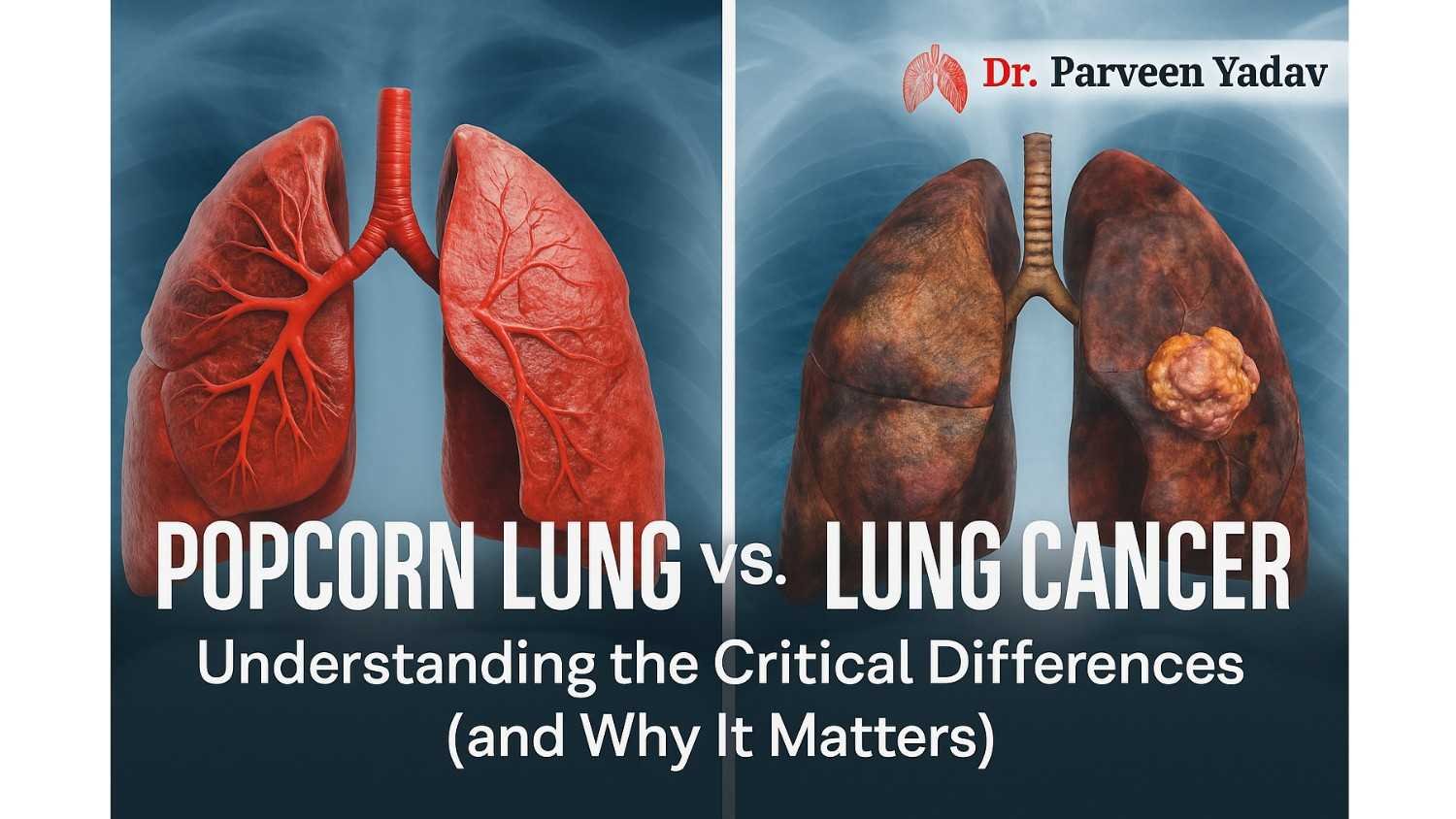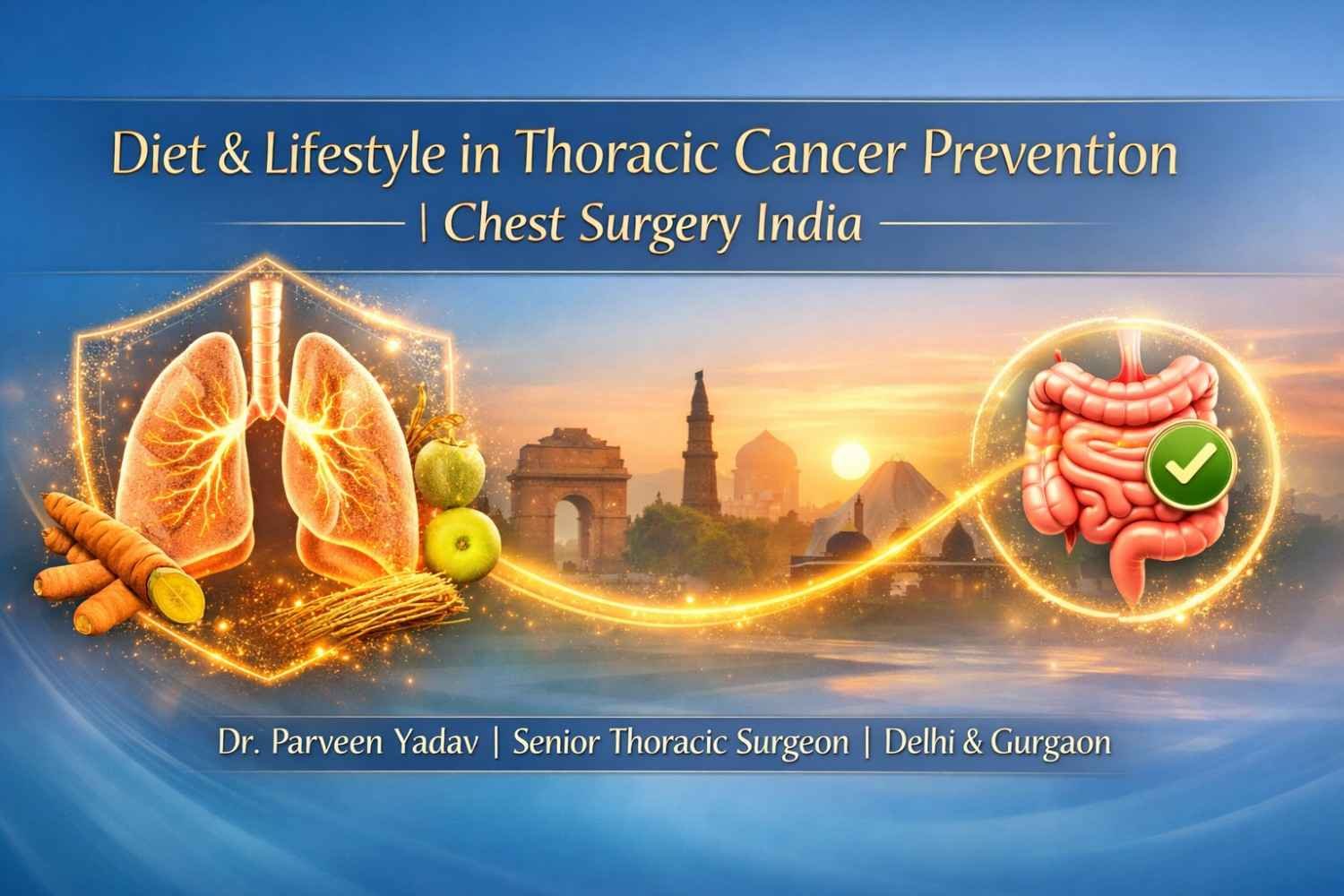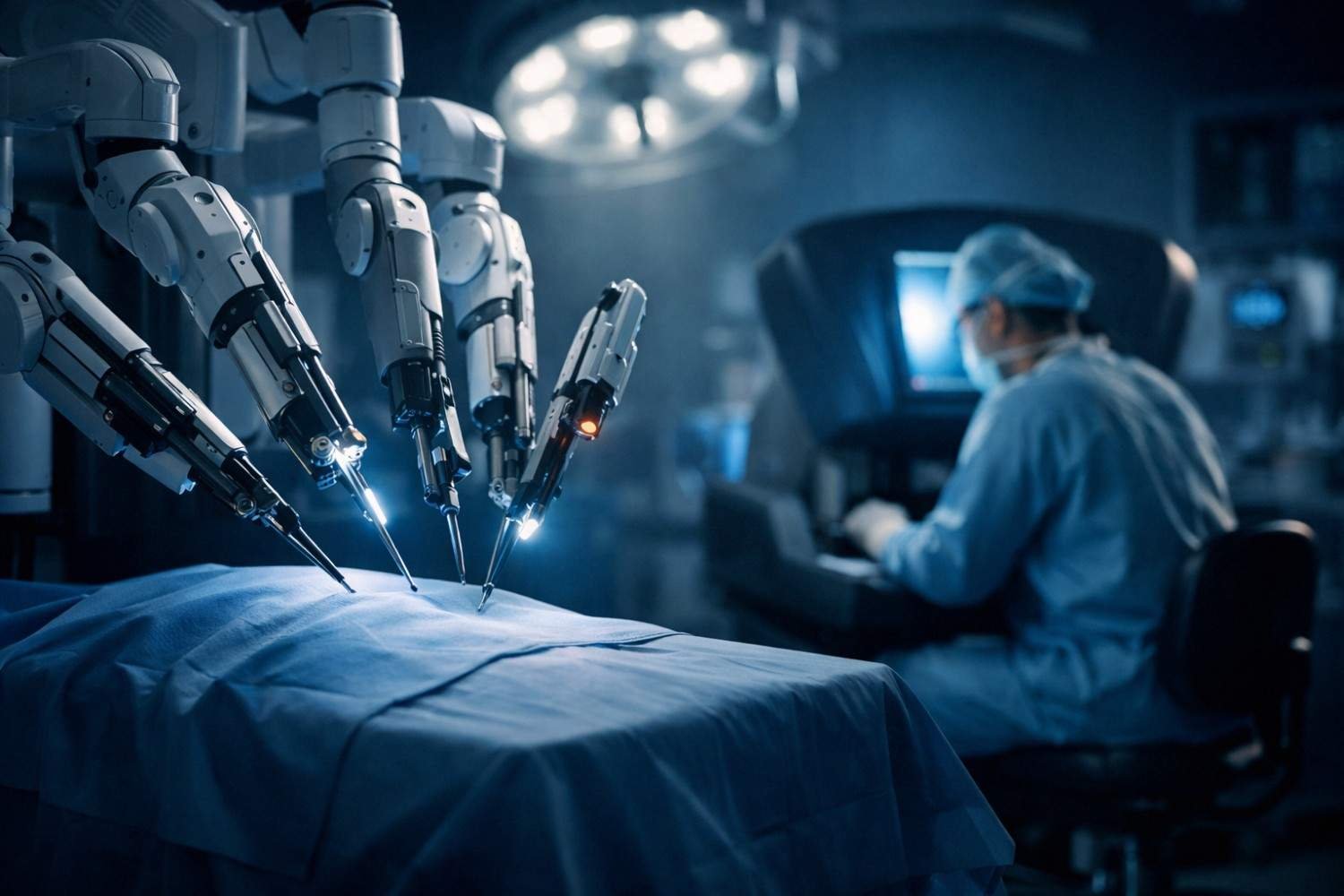

Nowadays, more and more people are becoming more careful about their lung health. With new lifestyle habits like vaping and rising pollution, breathing problems are not just for smokers anymore. But when someone hears about "Popcorn Lung" or "Lung Cancer," it often brings fear and confusion.
Are they the same thing? Can one lead to the other? Which one is more dangerous? These are common questions.
In this blog, we will explain both conditions in very simple words. We will show the difference between Popcorn Lung and Lung Cancer, as well as their symptoms, causes, and treatments. If you or someone you know is facing chest pain, breathing issues, or a cough that doesn't go away, this guide will help you understand what could be going on.
This article is prepared with inputs from Dr. Parveen Yadav and the expert team at Chest Surgery India in Gurgaon – who specialize in advanced lung and chest care. Our goal is to spread awareness and help you make better decisions about your health.
Popcorn Lung is the nickname for a rare and serious lung disease called Bronchiolitis Obliterans. It is not cancer, but it damages your lungs permanently. This condition mainly affects the smallest airways in your lungs, called bronchioles. These airways become inflamed and scarred, making it hard for air to pass through. Over time, breathing becomes more and more difficult.
It got the name "Popcorn Lung" because factory workers who made microwave popcorn got this disease after inhaling a chemical used for butter flavoring.
The main cause of Popcorn Lung is inhaling harmful chemicals, especially:
People who work in factories, chemical plants or who vape regularly may be more at risk.
Popcorn Lung symptoms usually start slowly but keep getting worse. They include:
In the beginning, it might look like asthma or bronchitis, so many people don't take it seriously.
Doctors use a combination of ways to diagnose this condition:
Sadly, Popcorn Lung has no cure. However, early treatment can slow down the damage and reduce symptoms.
Treatment may include:
The goal is to manage the condition, not to cure it. That's why early diagnosis is so important.
Lung Cancer is a dangerous disease where abnormal cells grow uncontrollably in the lungs. These cells form a lump or tumour, which starts affecting normal lung function. Unlike Popcorn Lung (which is non-cancerous), Lung Cancer is a malignant condition — which means it can spread to other parts of the body if not treated in time.
It is one of the most common and serious types of cancer, especially in people who smoke or have long-term exposure to pollution or chemicals.
There are two primary types of lung cancer:
Understanding the type helps doctors decide the best treatment.
The leading cause of lung cancer is smoking, but there are other risk factors too:
Even people who never smoked can get lung cancer due to environmental or genetic reasons.
Lung cancer usually does not show symptoms in the early stages, which makes it dangerous. Symptoms often appear when the disease has already spread:
If these symptoms are present, it's important to see a lung specialist immediately.
Doctors may use several tests to confirm lung cancer:
Lung cancer treatment depends on the type of cancer, its stage, and the general health of the patient. Treatment options include:
The prognosis (outcome) depends on how early the cancer is found. If detected early, many patients live longer and better lives.
Even though Popcorn Lung and Lung Cancer affect the lungs, they are very different diseases in nature, cause, symptoms, and treatment. Let's compare them in a simple table:
| Factor | Popcorn Lung (Bronchiolitis Obliterans) | Lung Cancer |
| Cause | Mainly caused by inhaling toxic chemicals like diacetyl | Mostly caused by smoking, air pollution, and genetics |
| Type of Disease | Inflammatory and fibrotic (non-cancerous) | Malignant tumor (cancer) |
| Risk of Spreading | Does not spread to other parts of the body | Can spread (metastasize) to other organs |
| Progression | Usually slow and chronic | Can be fast and aggressive, depending on type |
| Reversibility | Irreversible, but manageable | Potentially curable if caught early |
| Symptoms | Dry cough, breathlessness, wheezing | Persistent cough, chest pain, coughing blood, weight loss |
| Diagnosis Method | Lung function test, HRCT scan, sometimes biopsy | Imaging (CT/PET), biopsy, staging tests |
| Treatment Options | Steroids, inhalers, oxygen therapy, transplant in severe cases | Surgery, chemo, radiation, targeted & immunotherapy |
| Outlook | Can manage symptoms, but no permanent cure | Depends on stage; early detection improves chances |
| Can It Become Cancer? | No, it does not turn into cancer | It is already a cancerous condition |
These key differences help us understand that Popcorn Lung is not a type of cancer, but both conditions seriously affect breathing and need medical care.
This is a question that many people ask — especially those who vape or have worked around harmful chemicals. The answer is:
No, Popcorn Lung does not turn into Lung Cancer.
Popcorn Lung (Bronchiolitis Obliterans) is a non-cancerous lung disease. It causes damage and scarring in the tiny airways, but it does not involve abnormal cell growth like cancer. There is no direct scientific proof that Popcorn Lung changes into cancer over time.
However, here's where people get confused:
So, while Popcorn Lung doesn't become cancer, a person who vapes regularly or is exposed to toxic chemicals might be at risk for both.
That's why it's important to:
Remember, early detection of any lung problem — whether it's Popcorn Lung or Lung Cancer — gives you the best chance of managing or treating it.
Breathing is something we often take for granted — until it becomes difficult. Whether it's Popcorn Lung or Lung Cancer, early symptoms can feel small but may lead to something serious if ignored.
So, how do you know it's time to see a doctor?
If you have any of these symptoms — especially with a history of vaping, smoking, or chemical exposure — it's important to get a proper lung evaluation.
At Chest Surgery India, Gurgaon, we understand how scary these symptoms can be. That's why Dr. Parveen Yadav, a leading chest and lung specialist, is here to help you with:
Even if your condition is not severe, an early consultation can prevent bigger problems later.
Popcorn Lung and Lung Cancer may sound similar, but they are very different conditions. One is a rare inflammatory disease, and the other is a common type of cancer. But both can seriously affect your breathing, energy, and daily life — and both deserve timely medical attention.
At Chest Surgery India, Dr. Parveen Yadav and our expert team are dedicated to helping you understand, diagnose, and treat any lung-related issues with compassion and advanced care.
Whether it's Popcorn Lung, Lung Cancer, or any breathing problem — your health is our top priority.
Breathe better. Live better. Take the first step today by speaking to a lung expert.
1. What is the main difference between Popcorn Lung and Lung Cancer?
Popcorn Lung is a non-cancerous lung disease caused by chemical exposure, while Lung Cancer involves uncontrolled cancer cell growth in the lungs.
2. Can vaping cause Popcorn Lung?
Yes, vaping liquids with diacetyl and other chemicals can increase the risk of Popcorn Lung.
3. Is Popcorn Lung a type of cancer?
No, Popcorn Lung is not cancer — it's an irreversible inflammatory lung disease.
4. Can Popcorn Lung lead to Lung Cancer?
There’s no direct link, but both can be caused by inhaling harmful substances like chemicals in vapes.
5. What are early symptoms of Lung Cancer?
Persistent cough, chest pain, shortness of breath, and coughing up blood are early warning signs.
6. How is Popcorn Lung diagnosed?
It’s diagnosed using pulmonary function tests, HRCT scans, and sometimes a lung biopsy.
7. What is the treatment for Popcorn Lung?
Popcorn Lung is managed with inhalers, steroids, and oxygen therapy—there’s no permanent cure.
8. How is Lung Cancer treated?
Treatment includes surgery, chemotherapy, radiation, targeted therapy, and immunotherapy, based on the cancer stage.
9. Who is most at risk for Lung Cancer?
Smokers, passive smokers, and people exposed to radon, asbestos, or pollution are at higher risk.
10. When should I see a lung specialist?
See a specialist if you have a long-lasting cough, breathlessness, chest pain, or a history of vaping/smoking.

18+ Yrs Exp | 5,700+ Thoracic & Robotic Cancer Surgeries
Dr. Parveen Yadav is a Director and Senior Consultant in Thoracic and Surgical Oncology, specializing in minimally invasive and robotic lung and esophageal surgeries, with advanced training from AIIMS and Tata Memorial Hospital.
View Full Profile Pain After Thoracic Surgery: Tips for Smooth Recovery
Pain After Thoracic Surgery: Tips for Smooth Recovery
 Diet & Lifestyle for Thoracic Cancer Prevention | Dr. Parveen Yadav
Diet & Lifestyle for Thoracic Cancer Prevention | Dr. Parveen Yadav
 Robotic Thoracic Surgery: How Da Vinci Technology is Revolutionizing Chest Procedures
Robotic Thoracic Surgery: How Da Vinci Technology is Revolutionizing Chest Procedures
Struggling with pain after chest surgery? Dr. Parveen Yadav shares expert recovery tips, causes of shoulder pain, PTPS signs, and what your discharge sheet won't tell you.
Discover how diet, breathing exercises & daily habits help prevent and recover from thoracic cancer. Expert insights from Dr. Parveen Yadav, Chest Surgery India
Discover how Da Vinci robotic surgery is transforming chest procedures in Gurgaon. Less pain, faster recovery & expert care by a certified thoracic surgeon
Copyright 2026 © Dr .Parveen Yadav all rights reserved.
Proudly Scaled by Public Media Solution!